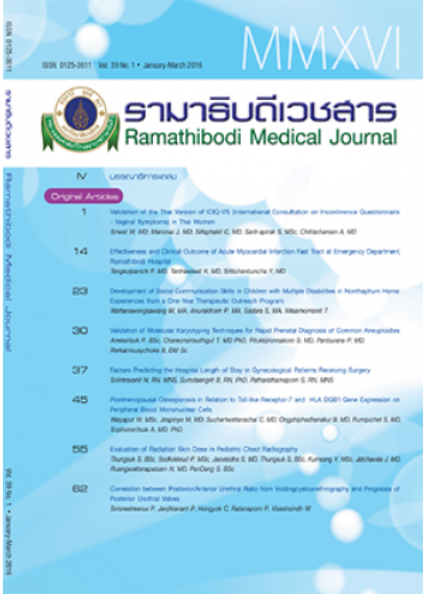Validation of Molecular Karyotyping Techniques for Rapid Prenatal Diagnosis of Common Aneuploidies
Keywords:
BACs-on-Beads, QF-PCR, Common aneuploidiesAbstract
BACs-on-Beads (BoBs) technology and Quantitative fluorescent PCR (QF-PCR) are recent molecular karyotping methods which have been used for prenatal diagnosis of the most common aneuploidies. Both of them are rapid, cost-effective and suitable for automation and can detect most abnormalities diagnosed by conventional karyotyping. The objective of this study was to evaluate the performance of bote molecular-based techniques for the detection of chromosomes 13, 18, 21, X and Y. The results obtained from 22 prenatal samples in which BACs-on-Beads technology (KaryoLiteTM BoBs and PrenatalTM BoBs), QF-PCR and conventional karyotype had been performed. We found that concordant KaryoLiteTM BoBs, PrenatalTM BoBs, QF-PCR and karyotype results were obtained in 95.5% (21/22) of the commonaneuploidies. Only a 49,xxxxx sample could not be detected by BoBs assay and QF-PCR. In conclusions, BoBs technology and QF-PCR are the reliable methods to detect common aneuploidies and should replace conventional sytogenetic analysis whenever prenatal testing is performed solely because of an increased risk of chromosomes 13, 18, 21, X and Y. Cytogenetic follow-up of molecular karyotyping findings is recommended to rule out mosaicism, ,aternal cell contamination, balanced rearrangement and polyploidy.
References
Cheng YK, Wong C, Wong HK, et al. The detection of mosaicism by prenatal BoBs™. Prenat Diagn. 2013;33(1):42-9. doi:10.1002/pd.4006.
Vialard F, Simoni G, Aboura A, et al. Prenatal BACs-on-Beads™ : a new technology for rapid detection of aneuploidies and microdeletions in prenatal diagnosis. Prenat Diagn. 2011;31(5):500-8. doi:10.1002/pd.2727.
Romana SP, Tachdjian G, Druart L, Cohen D, Berger R, Chérif D. A simple method for prenatal diagnosis of trisomy 21 on uncultured amniocytes. Eur J Hum Genet. 1993;1(3):245-51.
Pertl B, Kopp S, Kroisel PM, Tului L, Brambati B, Adinolfi M. Rapid detection of chromosome aneuploidies by quantitative fluorescence PCR: first application on 247 chorionic villus samples. J Med Genet. 1999;36(4):300-3.
Cirigliano V, Ejarque M, Cañadas MP, et al. Clinical application of multiplex quantitative fluorescent polymerase chain reaction (QF-PCR) for the rapid prenatal detection of common chromosome aneuploidies. Mol Hum Reprod. 2001;7(10):1001-6.
Mann K, Fox SP, Abbs SJ, et al. Development and implementation of a new rapid aneuploidy diagnostic service within the UK National Health Service and implications for the future of prenatal diagnosis. Lancet. 2001;358(9287):1057-61.
Cirigliano V, Voglino G, Ordoñez E, et al. Rapid prenatal diagnosis of common chromosome aneuploidies by QF-PCR, results of 9 years of clinical experience. Prenat Diagn. 2009 Jan;29(1):40-9. doi:10.1002/pd.2192.
Putzova M, Pecnova L, Dvorakova L, Soldatova I, Goetz P, Stejskal D. OmniPlex--a new QF-PCR assay for prenatal diagnosis of common aneuploidies based on evaluation of the heterozygosity of short tandem repeat loci in the Czech population. Prenat Diagn. 2008;28(13):1214-20. doi:10.1002/pd.2151.
Donaghue C, Mann K, Docherty Z, Ogilvie CM. Detection of mosaicism for primary trisomies in prenatal samples by QF-PCR and karyotype analysis. Prenat Diagn. 2005;25(1):65-72.
Shaffer LG, Coppinger J, Morton SA, et al. The development of a rapid assay for prenatal testing of common aneuploidies and microdeletion syndromes. Prenat Diagn. 2011;31(8):778-87. doi:10.1002/pd.2766.
Paxton CN, Brothman AR, Geiersbach KB. Rapid aneusomy detection in products of conception using the KaryoLite™ BACs-on-Beads™ assay. Prenat Diagn. 2013;33(1):25-31. doi:10.1002/pd.4003.
Grati FR, Gomes DM, Ganesamoorthy D, et al. Application of a new molecular technique for the genetic evaluation of products of conception. Prenat Diagn. 2013;33(1):32-41. doi:10.1002/pd.4004.
Rodratn N, Shotivaranon J, Chareonsirisuthigul T, Panburana P, Rerkamnuaychoke B. The Use of Quantitative Fluorescence PCR for Common Aneuploidy Detection in Prenatal Diagnosis. Ramathibodi Medical Journal. 2014;37(3):111-7.
Downloads
How to Cite
Issue
Section
License
Copyright (c) 2016 By the authors. Licensee RMJ, Faculty of Medicine Ramathibodi Hospital, Mahidol University, Bangkok, Thailand

This work is licensed under a Creative Commons Attribution-NonCommercial-NoDerivatives 4.0 International License.













